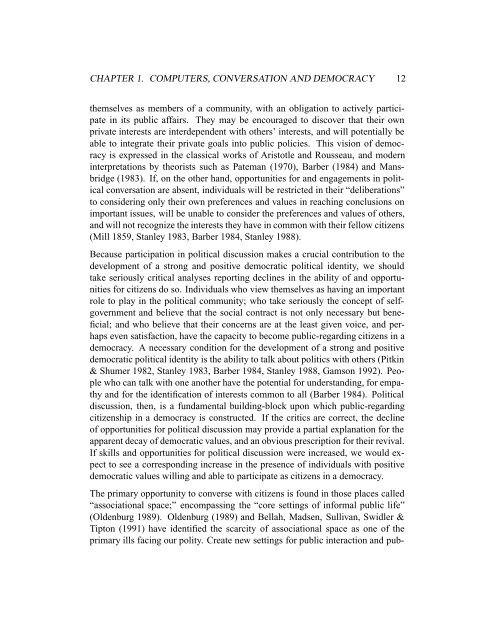Expanding the Public Sphere through Computer ... - ResearchGate
Expanding the Public Sphere through Computer ... - ResearchGate
Expanding the Public Sphere through Computer ... - ResearchGate
You also want an ePaper? Increase the reach of your titles
YUMPU automatically turns print PDFs into web optimized ePapers that Google loves.
CHAPTER 1. COMPUTERS, CONVERSATION AND DEMOCRACY 12<br />
<strong>the</strong>mselves as members of a community, with an obligation to actively participate<br />
in its public affairs. They may be encouraged to discover that <strong>the</strong>ir own<br />
private interests are interdependent with o<strong>the</strong>rs’ interests, and will potentially be<br />
able to integrate <strong>the</strong>ir private goals into public policies. This vision of democracy<br />
is expressed in <strong>the</strong> classical works of Aristotle and Rousseau, and modern<br />
interpretations by <strong>the</strong>orists such as Pateman (1970), Barber (1984) and Mansbridge<br />
(1983). If, on <strong>the</strong> o<strong>the</strong>r hand, opportunities for and engagements in political<br />
conversation are absent, individuals will be restricted in <strong>the</strong>ir “deliberations”<br />
to considering only <strong>the</strong>ir own preferences and values in reaching conclusions on<br />
important issues, will be unable to consider <strong>the</strong> preferences and values of o<strong>the</strong>rs,<br />
and will not recognize <strong>the</strong> interests <strong>the</strong>y have in common with <strong>the</strong>ir fellow citizens<br />
(Mill 1859, Stanley 1983, Barber 1984, Stanley 1988).<br />
Because participation in political discussion makes a crucial contribution to <strong>the</strong><br />
development of a strong and positive democratic political identity, we should<br />
take seriously critical analyses reporting declines in <strong>the</strong> ability of and opportunities<br />
for citizens do so. Individuals who view <strong>the</strong>mselves as having an important<br />
role to play in <strong>the</strong> political community; who take seriously <strong>the</strong> concept of selfgovernment<br />
and believe that <strong>the</strong> social contract is not only necessary but beneficial;<br />
and who believe that <strong>the</strong>ir concerns are at <strong>the</strong> least given voice, and perhaps<br />
even satisfaction, have <strong>the</strong> capacity to become public-regarding citizens in a<br />
democracy. A necessary condition for <strong>the</strong> development of a strong and positive<br />
democratic political identity is <strong>the</strong> ability to talk about politics with o<strong>the</strong>rs (Pitkin<br />
& Shumer 1982, Stanley 1983, Barber 1984, Stanley 1988, Gamson 1992). People<br />
who can talk with one ano<strong>the</strong>r have <strong>the</strong> potential for understanding, for empathy<br />
and for <strong>the</strong> identification of interests common to all (Barber 1984). Political<br />
discussion, <strong>the</strong>n, is a fundamental building-block upon which public-regarding<br />
citizenship in a democracy is constructed. If <strong>the</strong> critics are correct, <strong>the</strong> decline<br />
of opportunities for political discussion may provide a partial explanation for <strong>the</strong><br />
apparent decay of democratic values, and an obvious prescription for <strong>the</strong>ir revival.<br />
If skills and opportunities for political discussion were increased, we would expect<br />
to see a corresponding increase in <strong>the</strong> presence of individuals with positive<br />
democratic values willing and able to participate as citizens in a democracy.<br />
The primary opportunity to converse with citizens is found in those places called<br />
“associational space;” encompassing <strong>the</strong> “core settings of informal public life”<br />
(Oldenburg 1989). Oldenburg (1989) and Bellah, Madsen, Sullivan, Swidler &<br />
Tipton (1991) have identified <strong>the</strong> scarcity of associational space as one of <strong>the</strong><br />
primary ills facing our polity. Create new settings for public interaction and pub-
















